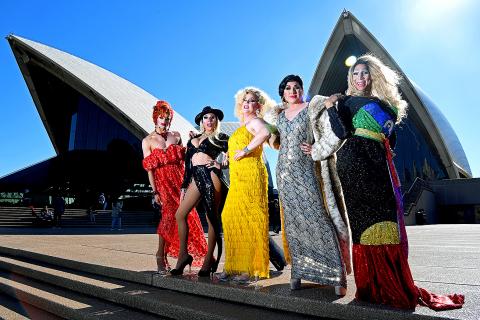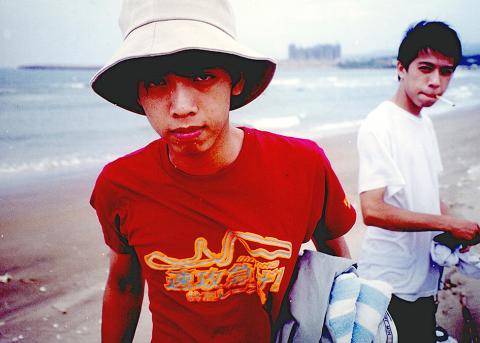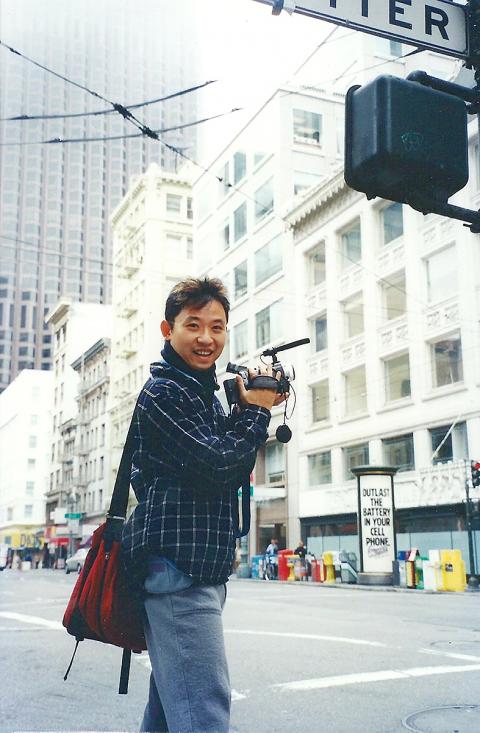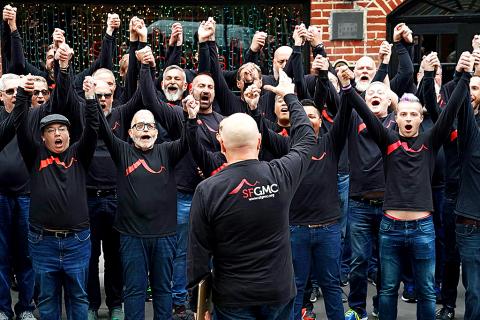Twenty-three years ago, Hsu Yu-sheng (許佑生) and his American partner Gary Harriman became the first gay couple to hold a public, albeit not legally recognized, wedding in Taiwan.
The event was captured on film by the late director Mickey Chen (陳俊志), and became the subject of his 1997 documentary Not Simply a Wedding Banquet (不只是喜宴). This was the first in a series of unprecedented, intimate portraits by Chen that brought Taiwan’s gay community to the big screen.
LGBT rights and representation have come a long way since then, not least with the legislation of same-sex marriage in May. Chen, who had increasingly dedicated his time to activism, did not live to see that historic moment, passing away late last year at the age of 51.

Photo: EPA-EFE
He will be honored at this year’s Taiwan International Queer Film Festival in Taipei and Kaohsiung through a retrospective of six works, including a previously unreleased documentary about HIV-positive people in Taiwan.
CELEBRATORY ATMOSPHERE
Chen’s commemoration will strike one of the more somber notes in a festival that’s otherwise celebrating an exhilarating year in high drag and fetish leather.

Photo courtesy of Taipei Film Festival
Some of those celebrations will be literal. Tomorrow’s opening film, A Very Sordid Wedding, sets the tone with a campy clash of small-town family values and homophobia in the US, revisiting beloved characters from director Del Shores’ 2000 cult comedy Sordid Lives.
Riot takes the party to the streets with a dramatized account of the 1978 protest that became the first Sydney Gay and Lesbian Mardi Gras, now one of the largest pride parades in the world. On Sunday, Sydney Mardi Gras co-chair Giovanni Compolo-Arcidiaco and leading local LGBT rights activist Jennifer Lu (呂欣潔) will be panelists in a discussion about the role of glittery LGBT carnivals in a serious social movement.
Feel-good stories like these abound, even if some take a tragicomic approach. They acknowledge progress even while demonstrating how essential a good sense of humor still is to get through life as an LGBT minority.

Photo courtesy of Taipei Film Festival
The mood is captured in this year’s theme, “Dou Zhen (逗陣) Together” — a play on the Chinese words for teasing and struggling — as well as films like Tucked, a British odd-couple drama depicting the friendship and varied approaches to life of an aging queen and rising young starlet in the drag scene.
A-LISTERS
Some A-list names appear on the marquee this year. Canadian actress Ellen Page, who came out publicly in 2014, stars in My Days of Mercy, which simultaneously tackles the death penalty debate. French musician and actress Vanessa Paradis carries French-Mexican film Knife + Heart, one of the more experimental works on offer, which delves into a murder mystery in the porn industry.

Photo: Reuters
But some stories, particularly in the documentary section, also call attention to the inequalities remaining for causes that are less widely understood. Man Made goes behind the scenes of the world’s only bodybuilding competition exclusively for trans men in the US, while No Gender introduces audiences to intersex manga artist Sho Arai.
And there is welcome representation of LGBT experiences from outside of East Asia and the West. The Middle East is represented by Israeli film Red Cow, starring one of the region’s few out actresses Moran Rosenblatt, and Iranian short films Manicure and Parking. Southeast Asia contributes Vietnam’s Song Lang, with two pretty-boy leads portraying a debt collector and folk opera performer who form a connection, and the Philippines’ coming-of-age lesbian love story Billie and Emma.
The heart of the festival, however, remains in Taiwan. If Chen’s retrospective pays witness to a decade of LGBT culture up to the early 2000s, then the task of carrying that vision forward is left to the local short film selection.
Across 11 films made in the last two years, a younger generation of directors reflect on modern-day self and national identity through stories that range from BDSM in a military camp, to 1950s housewives who live double lives at night.

As Taiwan’s second most populous city, Taichung looms large in the electoral map. Taiwanese political commentators describe it — along with neighboring Changhua County — as Taiwan’s “swing states” (搖擺州), which is a curious direct borrowing from American election terminology. In the early post-Martial Law era, Taichung was referred to as a “desert of democracy” because while the Democratic Progressive Party (DPP) was winning elections in the north and south, Taichung remained staunchly loyal to the Chinese Nationalist Party (KMT). That changed over time, but in both Changhua and Taichung, the DPP still suffers from a “one-term curse,” with the

Jan. 26 to Feb. 1 Nearly 90 years after it was last recorded, the Basay language was taught in a classroom for the first time in September last year. Over the following three months, students learned its sounds along with the customs and folktales of the Ketagalan people, who once spoke it across northern Taiwan. Although each Ketagalan settlement had its own language, Basay functioned as a common trade language. By the late 19th century, it had largely fallen out of daily use as speakers shifted to Hoklo (commonly known as Taiwanese), surviving only in fragments remembered by the elderly. In

William Liu (劉家君) moved to Kaohsiung from Nantou to live with his boyfriend Reg Hong (洪嘉佑). “In Nantou, people do not support gay rights at all and never even talk about it. Living here made me optimistic and made me realize how much I can express myself,” Liu tells the Taipei Times. Hong and his friend Cony Hsieh (謝昀希) are both active in several LGBT groups and organizations in Kaohsiung. They were among the people behind the city’s 16th Pride event in November last year, which gathered over 35,000 people. Along with others, they clearly see Kaohsiung as the nexus of LGBT rights.

In the American west, “it is said, water flows upwards towards money,” wrote Marc Reisner in one of the most compelling books on public policy ever written, Cadillac Desert. As Americans failed to overcome the West’s water scarcity with hard work and private capital, the Federal government came to the rescue. As Reisner describes: “the American West quietly became the first and most durable example of the modern welfare state.” In Taiwan, the money toward which water flows upwards is the high tech industry, particularly the chip powerhouse Taiwan Semiconductor Manufacturing Co (TSMC, 台積電). Typically articles on TSMC’s water demand